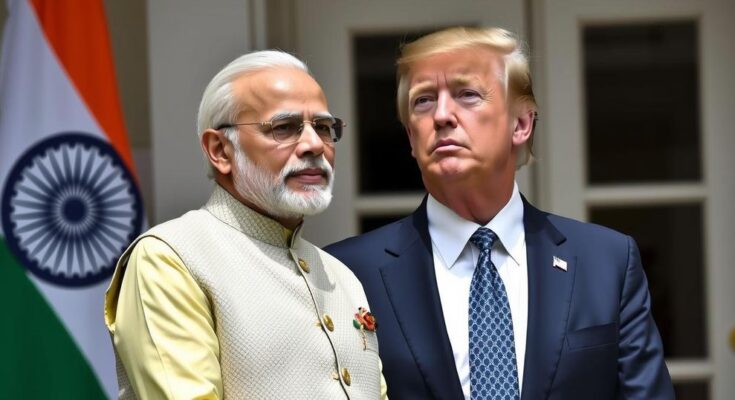The article analyzes the implications of Donald Trump’s second term on India-US relations, focusing on the strong personal rapport between Trump and Modi, which may benefit India amid ongoing trade tensions and the dynamics within BRICS. Despite tariff threats, India’s commitment to maintaining a pro-Washington stance could facilitate beneficial negotiations, providing an optimistic outlook for future engagements.
As President-elect Donald Trump prepares for his second term, he continues to wield his trademark application of tariffs towards various economies, including India, a crucial player within the BRICS coalition. Trump has previously criticized India, labeling it as a significant abuser in bilateral trade, leading to the imposition of tariffs that have sparked retaliatory measures from New Delhi. Despite the contentious trade backdrop, Prime Minister Narendra Modi enjoys a strong personal rapport with Trump, which could potentially benefit India amidst the increasing tensions surrounding the BRICS nations and the US dollar.
India’s unique positioning within BRICS, contrasted with the anti-American sentiment exhibited by fellow member states like China and Russia, may furnish it with leverage to navigate policy discussions more effectively. Analysts suggest that the alignment of India’s interests with those of the United States, especially regarding the containment of China, fosters a favorable environment for cooperation. Unwavering in its pro-Washington stance, India’s recent remarks by Foreign Minister Subrahmanyam Jaishankar reaffirm the commitment to maintaining the strength of the US dollar, distancing itself from discussions aimed at de-dollarization that might emerge within BRICS.
Modi’s leadership through the challenges of the past has fostered a dynamic yet cautious approach towards the Trump administration, providing ample opportunities for beneficial engagement. The trajectory noted during Trump’s first term, characterized by notable gatherings such as the “Howdy Modi” rally in Texas, underscores a mutual respect that travelers through the strategic partnership.
While the potential for turbulence remains due to Trump’s looming tariff threats affecting India’s trade surplus, experts believe that these challenges will pave the way for more transactional negotiations focused on immediate outcomes. For instance, India’s previous exemptions under Trump’s administration highlight a willingness to adapt and engage in high-stakes diplomacy. As both nations share similar views on international issues, the forthcoming term seems to hold promise for maintaining and furthering the relationship amid global uncertainties.
The article discusses the dynamics between India and the United States following the election of Donald Trump as President. It highlights the tariff policies Trump has enacted against various nations, including India, a founding member of BRICS—alongside Brazil, Russia, China, and South Africa. The context of the BRICS coalition, which faces pressure from the US, is examined as India navigates its stance amid existing tensions, particularly related to trade, national security, and geopolitical alignments, especially concerning China. The relationship between Trump and Modi is foregrounded as pivotal in shaping India’s diplomatic approach moving forward.
In summary, India, under Prime Minister Modi, is poised to leverage its unique position within BRICS amid Trump’s anticipated second term as President. While the trade relationship presents inherent challenges due to tariffs, India’s strong bilateral rapport with the United States—as evidenced by Trump and Modi’s personal connections—may enable fruitful negotiations and strategic partnerships. As India continues to affirm its commitment towards the US dollar and cautiously navigates its policies with the other BRICS members, the outlook remains optimistic for enhancing bilateral ties with the United States.
Original Source: www.cnn.com




